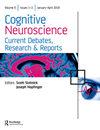嵌入式(4EA)认知计算神经科学。
IF 2.2
4区 医学
Q3 NEUROSCIENCES
Cognitive Neuroscience
Pub Date : 2024-07-01
Epub Date: 2024-09-21
DOI:10.1080/17588928.2024.2405192
引用次数: 0
摘要
我认为,关于神经计算和表征机制的观点和模型,包括计算架构、表征格式、编码方案、学习方法、计算-表征协调以及依赖于基质的方面,都必须通过研究具身神经系统来检验。因此,认知计算神经科学--对神经计算与神经表征的研究--必须是一个具身研究项目。本文章由计算机程序翻译,如有差异,请以英文原文为准。
Embodied (4EA) cognitive computational neuroscience.
I argue that ideas and models about the mechanisms of neural computation and representation - including computational architecture, representational format, encoding schemes, learning methods, computation-representation coordination, and substrate-dependent aspects - must be tested by studying embodied neural systems. Thus, cognitive computational neuroscience - the study of neural computations over neural representations - must be an embodied research program.
求助全文
通过发布文献求助,成功后即可免费获取论文全文。
去求助
来源期刊

Cognitive Neuroscience
NEUROSCIENCES-
CiteScore
3.60
自引率
0.00%
发文量
27
审稿时长
>12 weeks
期刊介绍:
Cognitive Neuroscience publishes high quality discussion papers and empirical papers on any topic in the field of cognitive neuroscience including perception, attention, memory, language, action, social cognition, and executive function. The journal covers findings based on a variety of techniques such as fMRI, ERPs, MEG, TMS, and focal lesion studies. Contributions that employ or discuss multiple techniques to shed light on the spatial-temporal brain mechanisms underlying a cognitive process are encouraged.
 求助内容:
求助内容: 应助结果提醒方式:
应助结果提醒方式:


